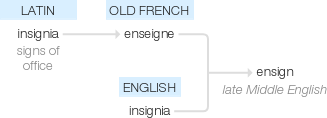Ensign
late Middle English: from Old French enseigne, from Latin insignia ‘signs of office’ (see insignia). Compare with ancient2.
wiktionary
From Middle English ensigne, from Old French enseigne, from Latin īnsignia, nominative plural of īnsigne. Doublet of insignia.
etymonline
ensign (n.)
early 15c., "a token, sign, symbol; badge of office, mark or insignia of authority or rank;" also "battle flag, flag or banner of a ship or troop of soldiers," via Scottish, from Old French enseigne (12c.) "mark, symbol, signal; flag, standard, pennant," from Latin insignia (plural); see insignia, which is a doublet of this word. As the word for the soldier who carries the flag, 1510s. U.S. Navy sense of "commissioned officer of the lowest rank" is from 1862. French navy had rank of enseigne de vaisseau at least since early 18c. Until 1871 one of the lowest grades of commissioned officers in a British army infantry regiment, also a rank in the American Revolutionary army.
